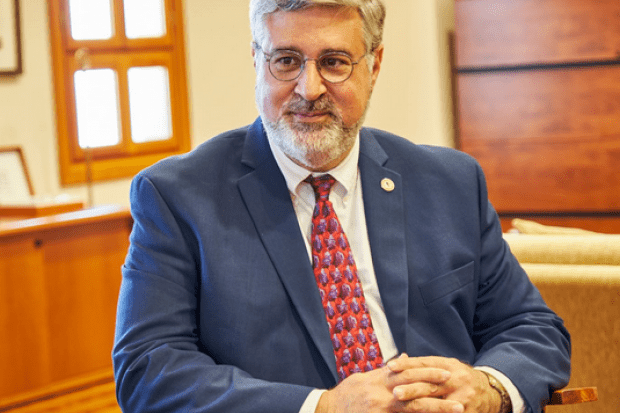When an enormous explosion rocked central Beirut in August 2020, it wasn’t just the estate of Lebanon’s oldest university that was badly damaged.
The blast – which was caused by vast amounts of ammonium nitrate dangerously stored in Beirut’s port and killed 215 people – was also a huge blow to staff morale and the already precarious finances of the American University of Beirut (AUB). Hundreds of international students cut short their studies or decided not to come altogether, explained its president, Fadlo Khuri. “We lost about 375 students and another 600 potential students who might have accepted places,” said Professor Khuri on the disaster that literally shook Lebanon (tremors were felt as far away as Europe).
“We suffered about $7.5 million [£6.2 million] in damage – with the windows of the new glass-fronted teaching hospital blown in,” recalled the Boston-born, Beirut-raised cancer doctor. With three of Beirut’s hospitals knocked out by the blast, the university’s medical centre nonetheless proved crucial in treating some of the 6,000 people injured by flying glass and masonry. “More than 750 people visited our emergency room in the first few hours, including many of our university community,” said the Yale- and Columbia-educated scientist.
For many staff, however, the blast proved the final straw. In the face of Lebanon’s financial collapse in 2019, AUB had already been forced to slash staff wages “to save the university”, as Professor Khuri explained at the time. It was then forced to cut 850 jobs in July 2020 after its revenues crashed by 60 per cent in 2020-21, as students struggled to afford tuition fees. A triple whammy was completed when it lost donations and scholarships it was expecting when the pandemic hit.
But the explosion was the tipping point for some faculty, admitted Professor Khuri. “It was a completely unanticipated psychological blow to our country and then promises to investigate swiftly were also broken – some people had enough,” he told Times Higher Education at a recent conference in Kuwait.
That exodus was, in part, a result of AUB’s reputation as one of the region’s outstanding universities. Established in 1866 by Protestant missionaries, the private university became a key study destination in the Arab region, with 60 per cent of its students from outside Lebanon by the mid-1970s, attracted by its US-style liberal arts teaching model. Things were tough during the civil war between 1975 and 1990 when professors and presidents were kidnapped: one president, Malcolm Kerr, an American Middle East scholar, was assassinated on campus by jihadists in 1984. But international students returned in the 1990s, and now account for 22 per cent of the institution’s 8,000 students.
However, with its faculty under financial strain, ambitious universities from nearby oil-rich states have poached staff. “We’ve raided them – particularly their administrators who are very good and understand the Arab context,” a senior leader from a Gulf state institution told THE.
Coping with the difficulties created by Covid, Lebanon’s unravelling economy and the explosion two years ago has been tough, admitted Professor Khuri, a former editor-in-chief at Cancer, who gave up a quieter life at Emory University in Atlanta, Georgia, to take over at his alma mater in 2015. “I felt the university needed someone with my leadership experience who understood education and the healthcare mission of a great university. But it’s certainly been difficult navigating these challenges,” he said.
Furthermore, providing opportunities for some of the 1.6 million Syrian refugees in Lebanon should not be overlooked, added Professor Khuri. “One-third of our population are non-resident aliens – that’s a challenge for any country, but we’ve addressed this with resources, such as providing scholarships for refugees,” he said, noting that AUB devoted $110 million to student aid last year.
Lebanon needs a top-tier research university more than ever, insisted Professor Khuri. “The university has created a sense of sanity amid Lebanon’s meltdown – we need to be that anchor institution so that the country can continue to innovate, lead and thrive,” he said. In practical terms, that means “giving faculty time to research and discover new things – not overloading them with teaching throughout the semester – even if that means they get snapped up by other places”, he reflected.
There are positive signs that the university can bounce back, Professor Khuri said, adding: “We have recruited 77 new faculty over two years and seen a significant increase in student recruitment.”
AUB’s standing, down to 13th in THE’s 2023 Arab University Rankings and 351-400th globally, may reflect some of this turmoil, but Professor Khuri was upbeat about his institution’s future. “Rankings don’t keep me awake at night – graduate employability does, but thankfully our students measure up with the best on this measure. Even our humanists are getting snapped up.”
Few university presidents will face so many complex or unexpected problems but Professor Khuri insisted he has no regrets. “I didn’t foresee these problems when I came back but I’m still grateful for the opportunity to serve at a fantastic institution.”
POSTSCRIPT:
Print headline: American University of Beirut fights back
Register to continue
Why register?
- Registration is free and only takes a moment
- Once registered, you can read 3 articles a month
- Sign up for our newsletter
Subscribe
Or subscribe for unlimited access to:
- Unlimited access to news, views, insights & reviews
- Digital editions
- Digital access to THE’s university and college rankings analysis
Already registered or a current subscriber? Login







